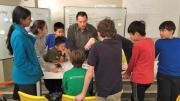“The two most important things that a math kid needs are time and friends.”
That was the central tenet for Paul Zeitz ’81 when he started Proof School, a mathematics-focused private middle school and high school in San Francisco. At the end of its first year, this past June, his venture had filled those dual needs for nearly four dozen students through a curriculum designed to create community for children with a passion for math.
Math has always been a social and pedagogical endeavor for Zeitz. Early in his career as a math professor at the University of San Francisco, where he still teaches and is now department chair, he moonlighted by training gifted high-school students for the International Mathematical Olympiad, in which he once competed. Then, while on sabbatical in 2013, he started a weekly “math circle” that brought six middle-school children together to learn and experiment with mathematics in a collective setting. That inspired the idea for Proof School: a place where students who love the subject can enjoy it together, with the creativity inherent in the subject given center stage.
He began the project, Zeitz says, as “chief networker and chief visionary.” Between 2013 and Proof School’s 2015 opening, he fine-tuned its mission and gathered a board of trustees and an advisory board. He also raised money. Seed funding came from an anonymous, multiyear donation he says was just enough to launch the school. (Local donors included many whose own math education had led to success in Silicon Valley.) The gifts have allowed the school—where tuition ranges from $35,200 to $37,200—to offer need-blind admissions. “It was very important to me,” Zeitz says, “that the school be completely inclusive in this way.” (Of this fall’s 57 incoming students, 21 will receive some type of aid, says school head and dean of mathematics Sam Vandervelde, with the average award “more than half the full tuition amount.”)
Besides inclusivity, Zeitz adds, what most differentiates Proof School are its pedagogical approach and its staff. At most middle and high schools, he asserts, skills in math can be stifled or stigmatized, often because promoting a love for logic, systems, and the inner workings of the world takes a backseat to rote memorization. “The difficulty,” he says, “is that most of the people who teach math don’t actually know what the subject is.” At his school, the teachers are “very rare hybrids…true mathematicians”—they all either have, or are pursuing, Ph.D.s—who “are actively contributing to the field, but also are committed teachers.”
Their pupils are organized by ability and skill level. “Maker studios,” where students apply lessons using origami, balloon shapes, and “scribble bots” programmed to draw, supplement standard curricula. Half the school day is devoted to math, and the year is broken into intensive six-week subject blocks, punctuated by six week-long “build weeks” of learning in a more hands-on way. Vandervelde describes the students as a diverse group who “are all curious about and appreciative of mathematics, but their further (or even primary) interests range from coding to art/animation to literature to science.” Zeitz says the school “really fosters an inclusive, cooperative culture. I think we can use the intellectual energy of Silicon Valley, but also apply a San Francisco-style respect for artistic creativity.”
For its second year, the school has added an additional level roughly equivalent to the eleventh grade. Although his venture has not yet been ranked by an independent body, Zeitz says that the multi-year process for accreditation should be complete by the time the first students apply for college. Now chairman of Proof School’s board of trustees, he says his “main job is worrying” about the school’s funding, public image, and future—strategic and logistical planning—while Vandervelde and the faculty take the educational and administrative lead.
Zeitz believes that openness to change and growth is ultimately what will keep the school moving forward. “Nobody really understands how people learn,” he says, “and it’s important to keep trying new things….I’m just glad we’ve had that opportunity. I’m just thrilled to watch it evolve.”









